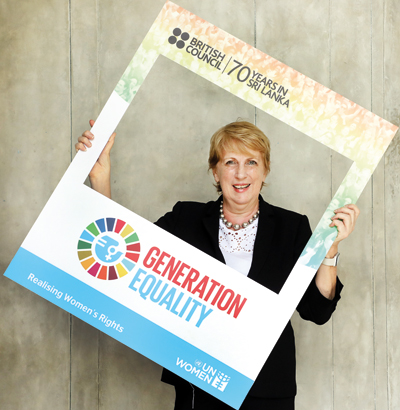British Council gives momentum to girls and women’s rights through the arts

Driving attitudinal change: BC Country Director Gill Caldicott. Pix by M.A. Pushpa Kumara
Today is International Women’s Day – a day dedicated to celebrating the achievements of women of all races, backgrounds and cultures throughout history and all across the globe.
The British Council, always a strong advocate for arts, culture, education and women’s rights. has adopted the United Nations (UN) Women’s campaign ‘Generation Equality: Realizing women’s rights for an equal future’ for this year’s celebration of International Women’s Day.
British Council Country Director Gill Caldicott said they were following the UN’s campaign as they felt it was important to get onto an international platform to collaborate with other organisations advocating a similar message.
“The UN’s campaign was particularly attractive to us because there’s the whole idea that there is a whole generation of people who are looking for equality. It resonates very much with what we hear from the young people we work with,” she said clarifying that it is not just young people they work with but it is the younger generation of Sri Lanka who strongly support equality, social justice and better opportunities for everyone.
Caldicott feels that in Sri Lanka in particular, the subject of rape and violence against women needs to be spoken about as they are issues that affect the people in society. Alongside the ‘Generation Equality’ campaign, the British Council will also be following 16 days of activism to ensure that their message is heard.
The BC being a strong proponent of women’s and girls’ rights for a long time, Caldicott says, ”We have had it as a sort of theme, a cross-cutting theme, to consider the empowerment of women and girls for quite a long time now and in all of our programming and in our staffing we look for gender balance and gender equity.”
Caldicott tells us that their workforce comprises mostly of women and whenever they have a programme they ensure that there is equal participation of both men and women. A few notable events they have had for women have been the ‘Women of the World’ festival, a ‘Voices and Choices’ programme, puppetry shows and more.
This March, the British Council is starting off with programmes internally for their staff as well as for the public. “The idea was to have a programme of really strong projects that engage people at the British Council during the month of March and that’s how we are kicking off 2020,” Caldicott explains.
On March 4, a press conference was held for the project completion and book launch of ‘Transforming Communities: Voices and Choices of Women and Girls’. The book shares the stories of 60 women and girls from rural communities. This was a collaboration with the Foundation for Innovative Social Development (FSID).
“They went out to rural communities and worked with women at that level in the community to empower them and take forward the initiatives (the women) wanted, whether it was social justice or creating a business, the idea that empowerment can start at the community level,” Caldicott said.
Today (Sunday) pop singer Ashanthi De Alwis will be releasing a new song commissioned by the British Council based on gender based violence with a concert out on the British Council lawn.
An exhibition called Creating Heroines under the ‘Animate Her’ project will be showcased on March 14-15. This stop-motion animation series of three inspiring Lankan women created by Irushi Tennekoon features author and artist Sybil Wettasinghe, conservationist Asha De Vos and architect Amila De Mel.
The British Council will also be participating at the Colombo Women’s International Film Festival to be held from March 15-22. A grant was given to five young local women filmmakers by the British Council for the ‘Female Filmmakers First Project’ to produce a few short films. The completed short films will also be screened at the festival.
Two films from the United Kingdom namely Rocks directed by Sarah Gavron and Freedom Fields directed by Naziha Arebi were also brought down to be screened at the Film Festival.
Explaining why British Council uses creative outlets such as art, theatre, music and puppetry to spread the message, Caldicott says, “I could tell you that violence is wrong, or I could show you and engage with you on an emotional level, and I think that’s what the arts can do.”
Caldicott personally believes that the arts are powerful, in making people question their own way of thinking and maybe even changing their attitude, which is the fundamental thing. Art she tells us is able to reach a large group of people, entertain, and it also has the power to raise awareness and convey a message in an interesting and engaging way.
Caldicott’s aim is to make 2020 count for women and girls everywhere, with the British Council’s focus on programmes “that promote gender equity and eliminate disadvantage this is at the heart of all the women and girls work we do”. It is about driving attitudinal change, she believes.


